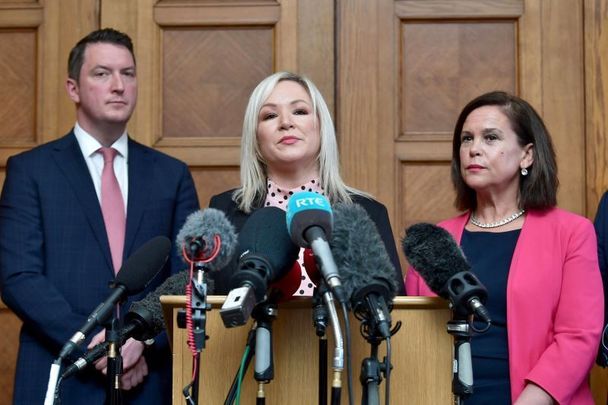For over 100 years, nationalists in Northern Ireland were considered by their unionist rulers to be the barbarians at the gate, to be prevented at all costs from ever gaining power. Unionism stood still for 100 years, continuously trumpeting support for the United Kingdom and Northern Ireland’s role in it.
However, in a cataclysmic event, those same unionist leaders have found, to their consternation, that they are suddenly playing second fiddle to the Irish nationalists, thanks to last week’s May 5 election in the North.
There was one issue uppermost in the minds of Sinn Féin leaders before the election. That was, the fact that 100 years had passed and suddenly an opportunity had presented itself to turn history on its head, shake Northern Ireland to its foundations, and create a new political reality.
The fact that Sinn Féin polled some 66,000 votes more than the main unionist party, the DUP, reveals how successful that campaign to oust and usurp Ulster unionism from leadership in Northern Ireland has succeeded.
On May 6, Northern Ireland woke to a new reality, one that William Butler Yeats once described as “all changed, changed utterly,” when he wrote about the Easter Rising in Ireland.
The election was not an Easter Rising, but it was a culmination of a revolutionary change in how Northern Ireland will be governed in the future.
The old tricks from the Ulster unionists failed utterly. Essentially they hoped to scarify their own voters and convince them that the great beast of Sinn Féin was about to take over the leadership of Northern Ireland.
But amazingly, the tactic did not work. Nor did the plot of trying to scare unionists with the impact of Brexit on Northern Ireland’s economy.
It seems that for once, a more common-sense approach won over a sufficient number of unionists to make profound change possible.
Sinn Féin has always been a strategic party, creating a 10-year vision where other parties only think of the next election. In 1981, before Bobby Sands was elected, the vote for Sinn Fein in Northern Ireland was approximately five percent.
The fact that it has grown to 29 percent is a clear example of the strategic genius that has changed the face of Northern Ireland.
Even writing the words “Sinn Féin first minister” has a historical cadence that makes one realize just how profound the change really is. The unionist redoubt has been breached, and things will never be the same in Northern Ireland again.
The fact is, of course, that logically, northern nationalists cannot administer a government that only pays obeisance to the United Kingdom. It is a contradictory position to have Sinn Féin as the largest party in the North, given the fact that they are dedicated to destroying the very state that they have now taken control of.
The fact that Sinn Féin will almost certainly win a majority in the next Irish Republic election further dictates the role ahead, which is now clear and simple.
There needs to be a referendum within five years on a united Ireland. The fact that most political parties in Ireland reject the possibility of such a vote actually makes it all the more inevitable.
You cannot argue with the ballot box. And if a political party dedicated to independence from Britain wins a clear plurality in the north and south of Ireland, the farewell bell has rung for British hegemony over the island of Ireland forever.
Yes, there has to be some convincing, but the other great news is the rise of the moderate Alliance Party, composed in the main of young candidates who have no living memory of The Troubles, and who want Northern Ireland to be an open and free society.
Crucially, they are not opposed in principle to the concept of a united Ireland. They too are a breath of fresh air, and their success – they won 17 seats last week, more than twice the eight they started with – shows just how much Northern Ireland has changed.
The unionist slow boat to nowhere has crashed on the rocks. A new, more articulate, more enlightened Northern Ireland leadership, with a clear commitment and plan, is the ultimate result.
There have been many significant moments in Irish history, but May 5, 2022, will rank right up there. It was the day when voters said enough, and a new dispensation was born.
*This editorial first appeared in the May 11 edition of the weekly Irish Voice newspaper, sister publication to IrishCentral.




Comments